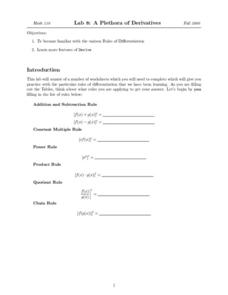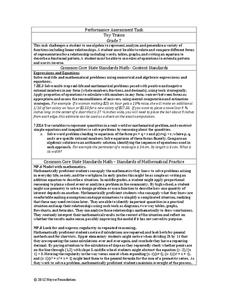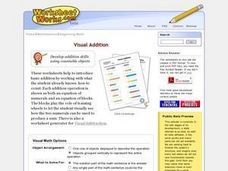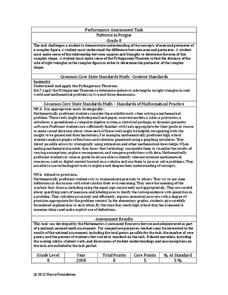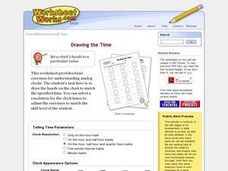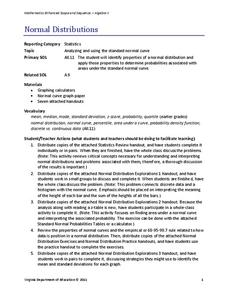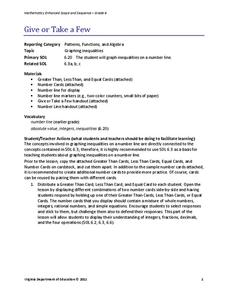Curated OER
Qualitative Analysis of the S-I-R Model
In this qualitative analysis worksheet, students explore the S-I-R model of determining given values of a function. They determine the maximum, minimum values and the slope. students write a rate equation for given information. This...
Curated OER
Leaf Patterns
First graders explore the existence of patterns in everyday items. In this science and math integrated lesson, 1st graders match leaves with a name word card and organize them into four patterns. This lesson includes a reading of And the...
Curated OER
The Babylonian Algorithm, Limits and Rates of Change
In this successive approximations worksheet, students use the Babylonian algorithm to determine the roots of given numbers. They identify the limits of a function, and compute the rate of change in a linear function. This two-page...
Curated OER
A Plethora of Derivatives
In this derivative worksheet, students fill in tables to identify the value of given functions. They write and utilize the addition rule, chain rule, multiple rule, product rule, quotient rule and power rule to solve functions. This...
Noyce Foundation
Toy Trains
Scholars identify and continue the numerical pattern for the number of wheels on a train. Using the established pattern and its inverse, they determine whether a number of wheels is possible. Pupils finish by developing an algebraic...
Curated OER
Mother Nature Pattern Maker
Young scholars in a teacher education program enhance their awareness of patterns. They discover how to support their students in developing this skill in mathematical terms. They role play the role of a K-2 student and collect images...
Curated OER
Family Vacation
Students use math to plan a trip by houseboat down the Mississippi River. They research and obtain information on the Mississippi River and its surroundings and use multiple graphs to represent their data.
Curated OER
Skip Counting
In this math worksheet, students complete 6 number patterns in which students fill in the missing numbers while skip counting. The addition pattern is already indicated for students. All numbers on the page are between 1 and 35.
Virginia Department of Education
Properties of Operations
Explore the definitions of algebraic properties through a hands-on activity. Individuals cut and paste examples and match them to the correct properties. After examining the provided examples, pupils create examples of their own.
Curated OER
Visual Addition
In this math learning exercise, students solve 14 addition problems in which visual clues are given. Students look at the pictures and write the addition equation which matches. Students add the numbers.
Curated OER
Numbers System Conversions
In this number system conversions worksheet, students explore, analyze and develop mastery skills in converting between alternative number systems.
Inside Mathematics
Patterns in Prague
Designers in Prague are not diagonally challenged. The mini-assessment provides a complex pattern made from blocks. Individuals use the pattern to find the area and perimeter of the design. To find the perimeter, they use the Pythagorean...
EngageNY
Fundamental Theorem of Similarity (FTS)
How do dilated line segments relate? Lead the class in an activity to determine the relationship between line segments and their dilated images. In the fourth section in a unit of 16, pupils discover the dilated line segments are...
Curated OER
Reading the Time (Telling Time to the Minute)
In this math worksheet, students examine 14 blank clock faces. Students read a time (in words) written underneath each clock and draw the hands to show this time. Times given are to the minute.
Curated OER
Rhombicuboctahedron
In this math learning exercise, students develop their cognitive and motor skills through constructing the geometric solid of a rhombicuboctahedron
Curated OER
Worksheet 11
In this math worksheet, students find a solution basis and compute the Wronskian for each of the equations. Then they sketch a graph of a typical solution.
Curated OER
Complete The Pattern
In this completing patterns worksheet, students use their problem solving skills to correctly fill in the 3 blanks at the end of each of 8 rows of shape patterns.
Inside Mathematics
Expressions
Strive to think outside of the quadrilateral parallelogram. Worksheet includes two problems applying prior knowledge of area and perimeter to parallelograms and trapezoids. The focus is on finding and utilizing the proper formula and...
Noyce Foundation
Parallelogram
Parallelograms are pairs of triangles all the way around. Pupils measure to determine the area and perimeter of a parallelogram. They then find the area of the tirangles formed by drawing a diagonal of the parallelogram and compare their...
Noyce Foundation
Sewing
Sew up your unit on operations with decimals using this assessment task. Young mathematicians use given rules to determine the amount of fabric they need to sew a pair of pants. They must also fill in a partially complete bill for...
Inside Mathematics
Two Solutions
Many problems in life have more than one possible solution, and the same is true for advanced mathematics. Scholars solve seven problems that all have at least two solutions. Then three higher-level thinking questions challenge them to...
Virginia Department of Education
Solving and Graphing Inequalities
You can't go wrong with a lesson plan that involves candy! Learners solve and graph one-variable inequalities and use candy to graph the solution. Individuals associate open circle graphs with life savers and closed circle graphs with...
Virginia Department of Education
Normal Distributions
Pupils work to find probabilities by using areas under the normal curve. Groups work to calculate z-scores and solve real-world problems using the empirical rule or tables.
Virginia Department of Education
Give or Take a Few
Young mathematicians extend their knowledge of rational numbers on a number line to graph inequalities by first using number cards to compare rational numbers. They finish by using similar reasoning to graph inequalities on a number line.





